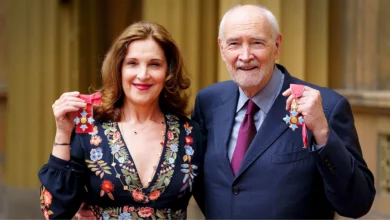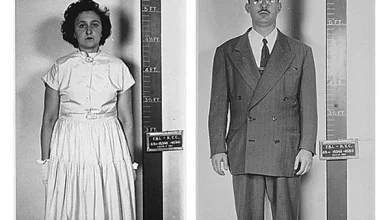Quentin Tarantino’s Ambitious Vision
Unveiling Quentin Tarantino's Quest to Adapt Ian Fleming's 'Casino Royale'

Quentin Tarantino’s desire to bring Ian Fleming’s ‘Casino Royale’ to the big screen became one of Hollywood’s worst-kept secrets. Following Pierce Brosnan’s departure as James Bond and the anticipation surrounding his successor, Daniel Craig, Tarantino’s interest in helming 007’s origin story sparked excitement among fans and industry insiders alike. However, despite Tarantino’s creative vision and the support of Brosnan, the producers initially dismissed the idea. This article explores the intricacies of the rights issues, Tarantino’s unique vision, and the eventual hard reboot of ‘Casino Royale’ in 2006.
Key Takeaways
- Quentin Tarantino expressed interest in adapting Ian Fleming’s ‘Casino Royale’ as a standalone film set in the 1960s, diverging from the traditional Bond franchise.
- The producers dismissed Tarantino’s adaptation, opting for a hard reboot of the Bond series that eventually cast Daniel Craig as the new James Bond.
- The rights to ‘Casino Royale’ posed a challenge, as the Broccoli family had secured the movie rights to all of Ian Fleming’s works, requiring collaboration with them for any adaptation.
- Tarantino’s pursuit of ‘Casino Royale’ contributed to the ongoing legacy of James Bond, even though his version of the film never materialized.
Quentin Tarantino’s Fascination: A Fresh Take on ‘Casino Royale’
Quentin Tarantino, renowned for his directorial prowess showcased in films like ‘Pulp Fiction,’ was captivated by the idea of exploring James Bond’s origin story. During his tenure with Miramax, Tarantino initiated discussions with the Ian Fleming estate, as they still held the rights to ‘Casino Royale.’ His vision involved a standalone movie set in the 1960s, a departure from the traditional Bond film franchise.
Tarantino expressed his enthusiasm, stating, “After ‘Pulp Fiction,’ I wanted to do my version of ‘Casino Royale.’ It would’ve been a one-and-done film, not part of a Bond series.” This unique approach intrigued both fans and industry insiders, with even Pierce Brosnan publicly voicing his interest in the concept. However, the producers dismissed the notion, and speculation arose that without Tarantino’s and Brosnan’s persistence, the official Bond series might not have embraced ‘Casino Royale’ as a hard reboot.
The Loophole Unveiled: Untangling the Rights Quandary
The secret Tarantino eyed was a peculiar loophole in the screen rights of ‘Casino Royale.’ When Danjaq originally inked their deal with Ian Fleming in the early 1960s, they failed to secure the rights to this particular novel because Fleming had already sold it. The screen rights were owned by Howard Hawks’ partner, Charles Feldman, which resulted in the creation of the peculiar 1967 adaptation of ‘Casino Royale,’ starring Woody Allen, Peter Sellers, and David Niven.
Had circumstances aligned differently, ‘Casino Royale’ could have witnessed Cary Grant playing the suave British spy under the direction of Howard Hawks, creating an altogether unique cinematic experience. However, this tantalizing prospect did not come to fruition.
The Bond Franchise’s Defensive Move: Preserving the Legacy
During the pre-production phase of Tarantino’s ‘Casino Royale,’ the Broccoli family, custodians of the James Bond franchise, foresaw the potential threat posed by Tarantino’s ambitious project. Anticipating that someone might attempt a similar endeavor, they proactively struck a comprehensive deal with the Fleming estate.
Tarantino disclosed, “The Broccolis made a blanket deal with the Fleming estate. They secured the movie rights to everything Fleming had ever written. This included short stories, travel books, and everything in between. They ensured that anyone wanting to adapt any of Fleming’s works would have to come to them.”
This strategic move by the Broccolis safeguarded the legacy of James Bond and prevented any opportunistic attempts to emulate Tarantino’s creative vision. Their comprehensive agreement effectively locked down the rights, leaving aspiring filmmakers, including Tarantino, with no choice but to seek permission and collaborate with the Bond franchise.
FAQ: Quentin Tarantino’s Quest to Adapt Ian Fleming’s ‘Casino Royale’
1. What made Quentin Tarantino interested in adapting ‘Casino Royale’?
Quentin Tarantino’s fascination with ‘Casino Royale’ stemmed from his desire to delve into James Bond’s origin story and offer a fresh take on the iconic character. After the success of his film ‘Pulp Fiction,’ Tarantino envisioned creating a standalone movie set in the 1960s that would capture the essence of Fleming’s novel. He saw an opportunity to bring his distinctive style and storytelling prowess to the Bond franchise, exploring Bond’s early days in a way that had not been done before.
2. How did Tarantino’s vision differ from the traditional Bond film franchise?
Tarantino’s vision for ‘Casino Royale’ diverged from the traditional Bond film franchise in several ways. Firstly, he aimed to make a standalone film rather than a part of the ongoing Bond series. His approach would have allowed him to focus on telling a complete story within the confines of a single movie, offering a unique experience for both Bond fans and Tarantino enthusiasts. Additionally, Tarantino intended to set the film in the 1960s, embracing the era’s distinctive style and atmosphere, which would have added a nostalgic touch to the narrative.
3. Did Pierce Brosnan support Tarantino’s adaptation of ‘Casino Royale’?
Yes, Pierce Brosnan, who had portrayed James Bond in the previous four films, expressed his interest in Tarantino’s adaptation of ‘Casino Royale.’ Brosnan found the concept intriguing and openly spoke about how fascinating it would be to see Tarantino’s take on the character. His support added fuel to the rumors and discussions surrounding Tarantino’s involvement in the project. However, despite Brosnan’s enthusiasm, the producers dismissed the idea, and ultimately, Daniel Craig was cast as the new James Bond for the official series’ reboot.
4. Why did the producers dismiss Tarantino’s adaptation initially?
The producers of the Bond franchise initially dismissed Tarantino’s adaptation of ‘Casino Royale’ due to their own plans for the character and the franchise’s direction. While Tarantino’s vision offered a fresh perspective, the producers had different ideas for the future of James Bond and sought to pursue a hard reboot of the series. They envisioned a new direction for the character and a fresh start that would redefine the Bond films for a new era. Consequently, they decided to move forward with their own approach, leaving Tarantino’s adaptation unrealized.
5. How did the rights issue affect Tarantino’s adaptation plans?
The rights issue surrounding ‘Casino Royale’ posed a significant challenge for Tarantino’s adaptation plans. Initially, Tarantino believed that the rights to the novel were still held by the Fleming estate, which sparked his interest in the project. However, he later discovered that the Broccoli family, custodians of the Bond franchise, had secured the movie rights to all of Ian Fleming’s works. This blanket deal encompassed not only ‘Casino Royale’ but also every other piece of writing by Fleming. As a result, Tarantino would have needed to collaborate with the Broccolis and obtain their permission to proceed with his version of ‘Casino Royale.’
6. What was the significance of the 1967 adaptation of ‘Casino Royale’?
The 1967 adaptation of ‘Casino Royale’ holds significance in the context of Tarantino’s pursuit of the novel’s adaptation. Produced by Charles Feldman, who owned the screen rights at the time, this rendition of ‘Casino Royale’ deviated from the traditional Bond formula, taking a more comedic and satirical approach. Starring actors such as Woody Allen, Peter Sellers, and David Niven,
Conclusion
Quentin Tarantino’s fascination with ‘Casino Royale’ and his desire to create a standalone adaptation set in the 1960s showcased his distinctive storytelling approach. While his version of the film was not realized, Tarantino’s pursuit played a role in shaping the future of the Bond franchise. The eventual hard reboot of ‘Casino Royale’ in 2006, with Daniel Craig taking on the role of James Bond, revitalized the series and introduced a new era for the iconic character.
Tarantino’s ambitious vision and the discussions surrounding his adaptation plans brought attention to the intricacies of rights ownership and the creative possibilities within the Bond universe. Although his take on ‘Casino Royale’ did not come to fruition, Tarantino’s impact on the franchise’s trajectory remains significant, leaving a lasting imprint on the history of James Bond on the silver screen.
A Guide to the Films of Quentin Tarantino











One Comment